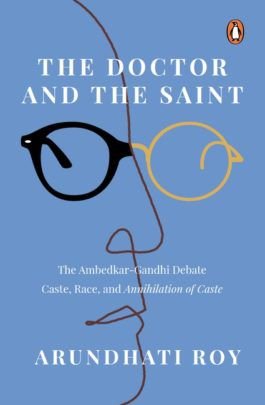The Doctor and The Saint

Rating: 4.6/5
Author: Arundhati Roy
Publisher: Haymarket Books
Publishing Date: May, 2017
Language: English
Genre: Non-Fiction
ISBN-10: 160846797X
ISBN-13: 978-1608467976
Format: Paperback
Pages: 184
Cost: Rs. 1,132 (Paperback), Rs. 161.85 (Kindle Edition)
Plot:
This book situates Ambedkar's arguments in their vital historical context- namely, as an extended public political debate with Mohandas Gandhi. "For more than half a century throughout his adult life- [Gandhi's] pronouncements on the inherent qualities of black Africans, untouchables and the labouring classes remained consistently insulting," writes Roy. "His refusal to allow working-class people and untouchables to create their own political organizations and elect their own representatives remained consistent too."
In The Doctor and the Saint, Roy exposes some uncomfortable, controversial, and even surprising truths about the political thought and career of India's most famous and most revered figure. In doing so she makes the case for why Ambedkar's revolutionary intellectual achievements must be resurrected, not only in India but throughout the world.
Review:
The book was originally written as the Introduction of the annotated version of "Annihilation of Caste (1936)", a speech written by Ambedkar which couldn't be delivered because of its intense scrutiny and criticism against the stigmatic caste-system in Hinduism.
To best understand and address the inequality in India today, Arundhati Roy insists we must examine both the political development and influence of M. K. Gandhi and why B. R. Ambedkar's brilliant challenge to his near-divine status was suppressed by India's elite. In Roy's analysis, we see that Ambedkar's fight for justice was systematically side-lined in favour of policies that reinforced caste, resulting in the current nation of India: independent of British rule, globally powerful, and marked to this day by the caste system.
Yes, to this day- the ‘modern’ India is marked by heinous crimes against the people based on caste discrimination. In fact, according to the National Crime Records Bureau, a crime is committed against a Dalit by a non-Dalit every sixteen minutes; every day, more than four Untouchable women are raped; every week, thirteen Dalits are murdered and six Dalits are kidnapped.
Arundhati Roy reveals the shameful treatment of India's untouchables, the Dalits. The famous but forgotten debate on caste between the great soul Gandhi and Ambedkar, drafter of the constitution and champion of the downtrodden, helped to define the era.
The book starts with a comparison between Malala Yousafzai and Surekha Bhotmaange. One had to face Islamic extremism and the other, barbaric casteism.
Roy examines the ridiculous situation of the outcastes with a plethora of words, heart wrenching in detail. Their condition since the colonial times to the republic times have been described in the book, within the framework of religion and politics. Short biographies of Gandhi and Ambedkar are given, as well an analysis of the demographic disturbances that occurred during the partition of Pakistan.
Roy makes a very ‘something to think about’ point again and again: that the plight of the Dalits is such that they have been used and abused, time and again, by others for political or social gains.
About the Author:
Arundhati Roy was born in 1960 in Kerala, India. She studied architecture at the Delhi School of Architecture and worked as a production designer. She has written two screenplays including Electric Moon (1992) that was commissioned by Channel 4 television.
Her first novel ‘God of small things’ won the Booker Prize for Fiction in 1997. An immediate bestseller, the novel was published simultaneously in 16 languages and 19 countries but caused controversy in India for the description of a love affair between a Syrian Christian and a Hindu 'untouchable'. She is also the author of several non-fiction books including: The Cost of Living (1999)- a highly critical attack on the Indian government for its handling of the controversial Narmada Valley dam project and for its nuclear testing programme; Power Politics (2001)- a book of essays; and The Algebra of Infinite Justice- a collection of journalism. The Ordinary Person's Guide to Empire was published in 2004. She has since published a further collection of essays examining the dark side of democracy in contemporary India ‘Listening to Grasshoppers: Field Notes on Democracy’(2009).
Her latest book is ‘The Ministry of Utmost Happiness’ (2017), her second novel. It was longlisted for the Man Booker Prize and, in the US, was a finalist for the National Book Critics Circle Award. For her work as an activist she received the Cultural Freedom Prize awarded by the Lannan Foundation in 2002.















































